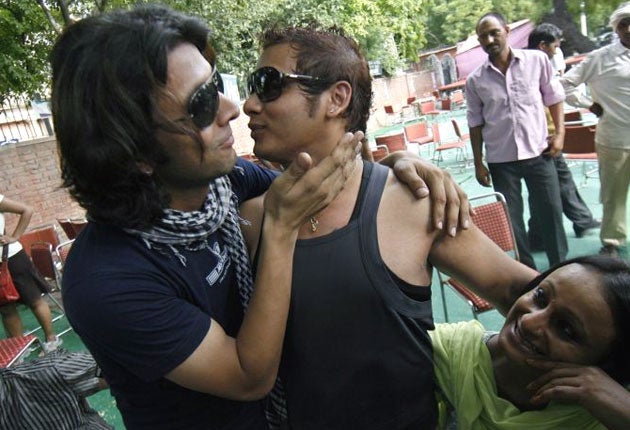Dancing in the streets after gay sex is declared legal in India

Your support helps us to tell the story
From reproductive rights to climate change to Big Tech, The Independent is on the ground when the story is developing. Whether it's investigating the financials of Elon Musk's pro-Trump PAC or producing our latest documentary, 'The A Word', which shines a light on the American women fighting for reproductive rights, we know how important it is to parse out the facts from the messaging.
At such a critical moment in US history, we need reporters on the ground. Your donation allows us to keep sending journalists to speak to both sides of the story.
The Independent is trusted by Americans across the entire political spectrum. And unlike many other quality news outlets, we choose not to lock Americans out of our reporting and analysis with paywalls. We believe quality journalism should be available to everyone, paid for by those who can afford it.
Your support makes all the difference.Jubilant crowds cheered outside a Delhi court yesterday after judges announced that gay sex was not a crime – a landmark ruling for India that spells the end for a 150-year-old law introduced by the British Raj.
Activists danced in the streets after the Delhi High Court ruled that "consensual sex amongst adults is legal which includes even gay sex and sex among the same sexes". The judgment, which technically only applies to the country's capital but which will have national implications, will boost the small but increasingly vocal gay rights movement.
"The mood inside the court was electric, it was incredible," said Gautam Bhan, who has been campaigning for the repeal of so-called "Section 377" for 10 years. "The judges quoted from a speech by Jawaharlal Nehru about India's inclusiveness. We were in tears, we were openly crying in court."
Another campaigner, Lesley Esteves, a journalist who was also at the court, said: "It's a historic day for queer people and everybody else in India. Finally we have been able to throw off this colonial legacy. I hope that other members of the Commonwealth are also able to do this."
Campaigners who had launched a legal challenge to the law said it was anti-constitutional because it acted as an impediment to fighting Aids as many gay people declined to be identified because of fear of harassment or discrimination. "We have finally entered the 21st century," said Anjali Gopalan, leader of Naz Foundation, a leading health and gay rights lobby which had brought the lawsuit.
Despite the court's decision, Section 377 can only be repealed by parliament. In recent days the government has indicated that it may be prepared to review the law and is considering getting rid of it.
Join our commenting forum
Join thought-provoking conversations, follow other Independent readers and see their replies
Comments